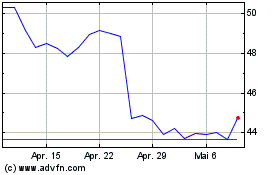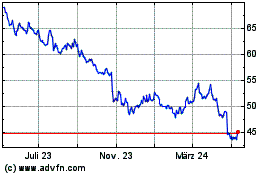Credit Markets: Investors Grab $20 Billion in IBM Debt -- WSJ
09 Mai 2019 - 9:02AM
Dow Jones News
By Sam Goldfarb
This article is being republished as part of our daily
reproduction of WSJ.com articles that also appeared in the U.S.
print edition of The Wall Street Journal (May 9, 2019).
International Business Machines Corp. sold $20 billion of bonds
Wednesday to help fund its purchase of Red Hat Inc., adding to a
busy week for corporate-debt issuance a day after Bristol-Myers
Squibb Co. sold $19 billion of bonds to finance its acquisition of
Celgene Corp.
IBM's sale is the largest of the year -- overtaking the
Bristol-Myers deal -- and tied for the seventh-largest on record,
according to Dealogic.
Despite signs that the trade tensions between the U.S. and China
could continue longer than expected, investors said Wednesday that
strong demand for corporate debt persists, given paltry
government-bond yields and a recent run of encouraging U.S.
economic data.
While it has ticked up in recent days, the extra yield, or
spread, that investors demand to hold investment-grade bonds over
Treasurys still finished Tuesday at 1.14 percentage points, down
from 1.53 percentage points at the end of 2018, according to
Bloomberg Barclays data. That decline has come as the average U.S.
Treasury yield has also dropped to 2.39% from 2.62%, largely due to
signals from the Federal Reserve that it won't raise interest rates
this year.
"Notwithstanding mark-to-market wiggles and near-term political
jitters, the fundamentals of the global economy look decent,
especially the U.S. economy, and companies are being opportunistic
and issuing while they can," said Mike Collins, a portfolio manager
at PGIM Fixed Income.
The Dow Jones Industrial Average stabilized Wednesday, a day
after logging its largest one-day decline since Jan. 3.
But Tuesday's stock declines hardly slowed the bond market.
Along with the Bristol-Myers sale, businesses with
speculative-grade credit ratings, including United Continental
Holdings Inc. and power company NRG Energy Inc., announced and then
sold $5.4 billion of bonds on Tuesday. That was the first time
so-called drive-by issuance has totaled at least $5 billion in more
than two years, according to LevFin Insights.
Meeting solid demand from investors, IBM on Wednesday was able
to reduce the spread on its longer-maturity bonds by 0.1 percentage
point from initial guidance, somewhat less than Bristol-Myers a day
earlier. IBM sold $3.25 billion of 10-year bonds at a 3.53% yield,
or 1.05 percentage-point spread, compared with initial guidance of
1.15 percentage points.
Appetite for newly issued corporate bonds extended into the
secondary market. Bristol-Myers' new 3.4% bonds due 2029 traded
late Wednesday at 99.364 cents on the dollar, translating to a
yield-premium of 0.99 percentage point relative to Treasurys,
according to MarketAxess. The bonds were sold Tuesday at 99.125
cents and a 1.05 percentage-point spread.
Both IBM and Bristol-Myers notably carry high credit ratings
even by the standards of investment-grade companies. Despite a
roughly $50 billion debt load that will grow with the Red Hat
purchase, Moody's Investors Service said in October that it will
likely downgrade the company by just one notch to A2 from A1 after
completing a review. IBM has said it will suspend share repurchases
in 2020 and 2021 to pay down debt.
Moody's similarly indicated last week that it would likely
downgrade Bristol-Myers' credit rating one notch to A3 from A2.
That sets both businesses apart from many others that have recently
settled at the bottom rung of the investment-grade credit ladder, a
trend that has raised concerns about downgrades to junk if there is
an economic downturn.
IBM last month reported a third consecutive quarter of declining
revenue, which it blamed in part on clients in the Asia-Pacific
region delaying business decisions. The company's planned
acquisition of Red Hat, an open-source software and services
company, is part of IBM Chief Executive Ginni Rometty's larger
effort to revitalize the computing giant by focusing on its
cloud-computing business. The deal, valued at around $33 billion,
is IBM's largest-ever acquisition and is expected to close in the
second half of the year.
An IBM spokesman said the company "has a strong balance sheet,"
and would be able to use the cash it generates to invest in "high
value-segments of our industry as well as provide continued
dividend growth."
Write to Sam Goldfarb at sam.goldfarb@wsj.com
(END) Dow Jones Newswires
May 09, 2019 02:47 ET (06:47 GMT)
Copyright (c) 2019 Dow Jones & Company, Inc.
Bristol Myers Squibb (NYSE:BMY)
Historical Stock Chart
Von Mär 2024 bis Apr 2024

Bristol Myers Squibb (NYSE:BMY)
Historical Stock Chart
Von Apr 2023 bis Apr 2024
